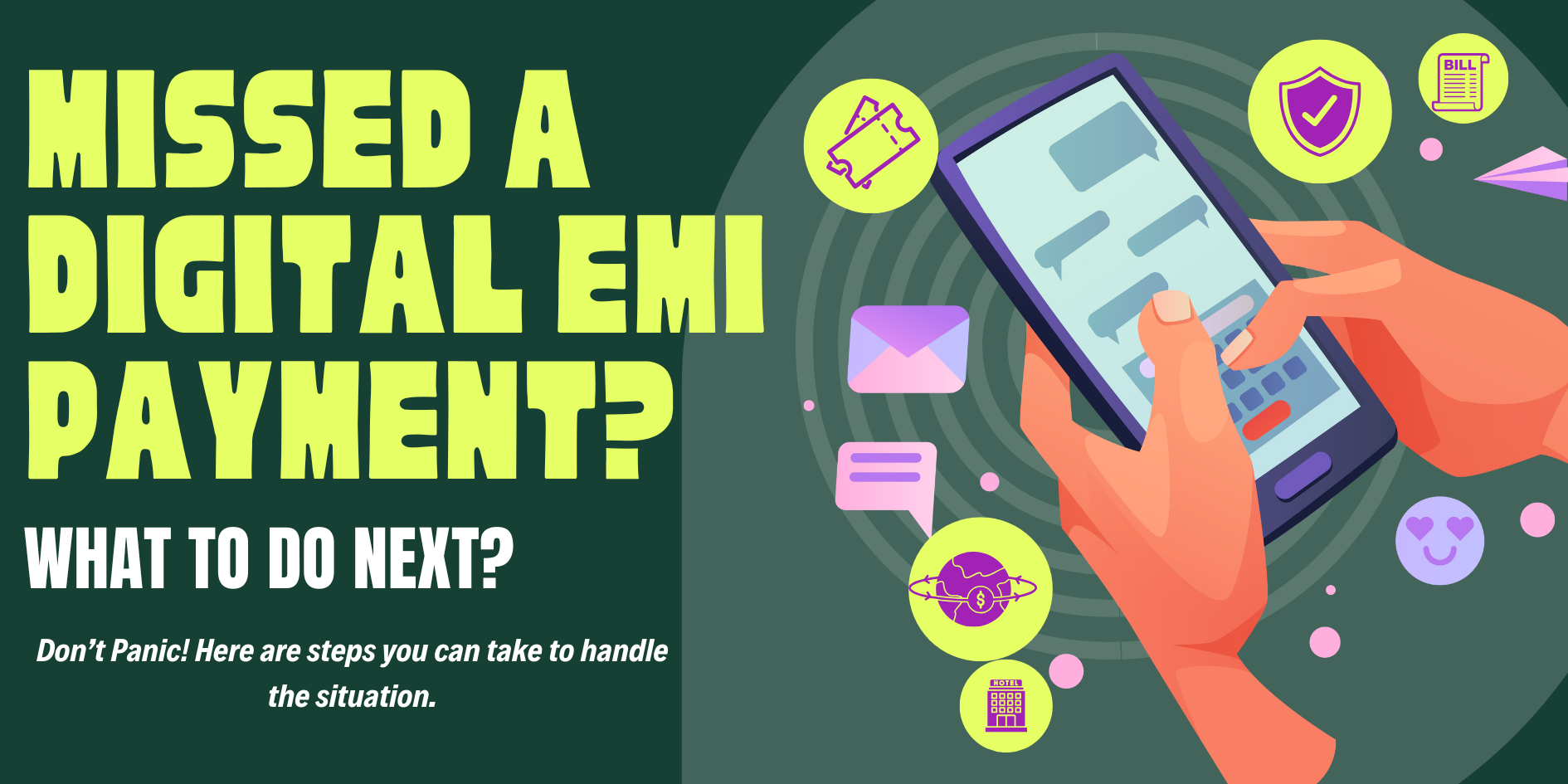Missed a Digital EMI Payment? What to Do Next

Even the most disciplined borrowers can miss an EMI due to unexpected events, from an urgent medical bill to a delayed salary.
Now, missing a payment no doubt has consequences, but the good news is that this happens to a lot of people, and it's not the end of the world. If you act quickly, you can do a lot to manage its impact. This blog explains what happens when you miss a digital EMI payment and the steps you can take to address it effectively.
The Consequences Of Missing A Digital Payment
If you have a loan, you will be paying digital EMIs, and this amount is automatically debited from your account on a set date every month. As long as you have adequate funds in the account, you are good to go.
However, if there are insufficient funds on that day for any reason, the payment will be missed. Here is what follows:
● You get a failed auto-debit transaction alert the moment the payment fails.
● Lenders then impose a "bounce charge" or "late fees," which vary from lender to lender.
● In addition to this, you also get charged interest on the overdue amount for each day beyond the day the payment was due.
● The lender will follow up with you via email, SMS, or a call to remind you to clear the payment as soon as possible.
You must also note that each missed EMI will also drop your credit score by 50 to 70 points. This will also remain on our credit report for the next seven years. In simple terms, a credit score is like a report card that keeps track of the money you are borrowing and how well you are paying it back.
Also Read: What is Loan Overdue - How to Clear Overdue Loan Payments?

That said, each lender usually gives you a couple of days' grace period to clear your payment, avoiding serious consequences.
The Next Steps To Take If You Miss A Digital EMI Payment
If by any chance a payment has been missed in error, fret not. All you need to do is act quickly and do the following:
Clear the payment immediately through your lender’s app or online payment link (this is usually provided in the failed auto-debit transaction alerts).
Reach out to your lender to let them know that the payment has been made. While they will be notified anyway, this can create a positive impression with the lender. They may also waive the additional fees in genuine cases or restructure your loan to help reduce your financial burden.
Set up reminders to ensure that you always have an adequate balance on the date the EMI is due. You can also request your lender to adjust the auto-debit date closer to when your salary gets credited.
How To Avoid Future Missed Payments?
Once you’ve addressed a missed EMI, the next step is to make sure it never happens again. Here are a few pointers to help you do that.
Always keep one to two months’ EMI amount additionally in a separate account. If this is not possible, don't hesitate to dip into your emergency fund to maintain adequate funds in the main account before the due date.
Make it a habit to review upcoming debits each month. This way, you’re always prepared and never miss the due date.
Make sure to set up email and SMS alerts and enable app notifications to serve as additional reminders of upcoming payments.
Before you take a loan, always use a personal loan EMI calculator to understand what your EMIs would be to ensure that you don't strain yourself financially.
Stay On Track With Your EMIs
Missing a digital EMI payment can happen to anyone. Being quick on your feet in the event this happens will help you protect your credit score, avoid unnecessary fees, and keep your finances on track. Always remember, borrow responsibly; your future financial health will thank you.
If you’re looking for a personal loan app that fits your budget and repayment capacity, check your personal loan eligibility with Hero FinCorp in just a few steps. You could get the funds you need without disrupting your monthly commitments.
Frequently Asked Questions
1. Can I request my lender to waive late fees for a missed EMI?
Yes, you can, especially if it’s your first miss and your repayment history is strong. That said, the approval is at the lender's discretion, and the sooner you let them know, the better your chances.
2. Will partial payment of a missed EMI help?
A partial payment is a step in the right direction and will help reduce the interest on the overdue balance. However, your account will still be marked overdue till the entire amount is cleared.
3. How soon is a missed EMI reported to credit bureaus?
A missed EMI is typically reported within 30 days (varies by lender) of a missed payment. The course of action is always to pay within the grace period and avoid this situation altogether.
4. Can I use a credit card to pay a missed EMI?
Some lenders do accept EMI payments via credit cards via payment gateways. However, please note that interest rates on credit cards are generally twice that of personal loans, and this could land you in a debt cycle. Dipping into your emergency fund is always the better alternative.